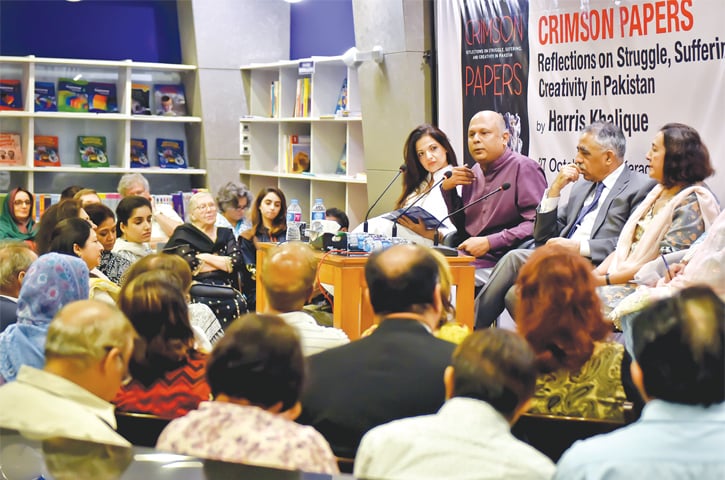
KARACHI: An interesting discussion on the contents of the book Crimson Papers between its author Harris Khalique and journalist Reema Abbasi had the audience’s undivided attention, keeping them glued to their seats till the end of the programme arranged at Oxford Bookshop, Dolmen Mall on Friday.
The first point that Ms Abbasi raised was about absolutism discussed in the book. Mr Khalique said the book contained four long essays, spanning the periods from partition of India to present times. They challenged the erasure of memory, an absence of a sense of history. We lived in a time where things were seen in binaries that had brought us down to the level of current affairs, making it hard to have a civilised conversation.
Ms Abbasi pointed out that in the writer’s view Pakistan’s relations with Afghanistan were more tumultuous than with India. Mr Khalique elaborated that there were certain myths and competing narratives. Our relations with Afghanistan were far more difficult than with India. Despite the crossfire on the Line of Control, 140,000 Pakistanis visited India recently.
Ms Abbasi at that point named the four essays in the book — blood, sweat, tears and ink. With reference to the first she mentioned Sepoy Maqbool Husain. Mr Khalique said there was more discussion on 1971 compared to 1947. The element of class was evident. Gen Niazi’s story we [often] read but the tragedy of a soldier was never discussed. Sepoy Maqbool Husain was a prisoner of war who was kept in an Indian prison for more than 40 years. The sepoy was not recognised in any narrative.
This led the conversation to the topic of competing narratives. The author highlighted there were three narratives — of Pakistan (that began from 1947) of Bangladesh (that began from 1971) and of India (that began from 800AD). We needed to look at them together, he urged.
Then came the subject of Ahmed Bashir’s friendship with the writer’s father Ibrahim Khalique, and the days of labour and left-wing movements. The author didn’t agree with Ms Abbasi that the left was dead. He called it a demise of a certain kind. He argued that the desire to see a better world, to see every child have access to school, and the question of having equal opportunities for everyone were still there.
After that Ms Abbasi turned her attention to the chapter tears. Mr Khalique said it was about five women — Shabana, Aasia, Saeeda Bibi, Sabeen Mahmud and Perween Rahman. This was followed by chitchat on Allama Iqbal and the writer’s [who is also a poet] fondness for him. He said Iqbal raised the bar high. We couldn’t criticise him for what happened after 1947. One had to read him.
The next exchange of ideas was on Pakistan’s English-language poets. Mr Khalique had high praise for them lamenting they’re not as often talked about as they merited. He extolled the works of poets such as Maki Kureishi, Daud Kamal and Taufique Rafat.
Sindh Governor Muhammad Zubair was the special guest on the occasion. He said Pakistan was supposed to be a liberal, tolerant society but somehow we went completely the other way. That was where Pakistan missed the ideals of the Quaid-i-Azam. A liberal tolerant society did not mean leaning towards the left, it could come from the right or centre, anywhere.
Mr Zubair said Crimson Papers was a wonderful book. He could not believe that such a small book could contain so much in terms of history and something to debate on. The speech that the Quaid-i-Azam made on Aug 11 was a statement on what Pakistan should be: people with any religious background would have the same rights. After the Objectives Resolution every leader [in power] attempted to use religion, Islam, for political purposes.
Earlier MD OUP Ameena Saiyid welcomed the guests.
Published in Dawn, October 28th, 2017











































Dear visitor, the comments section is undergoing an overhaul and will return soon.